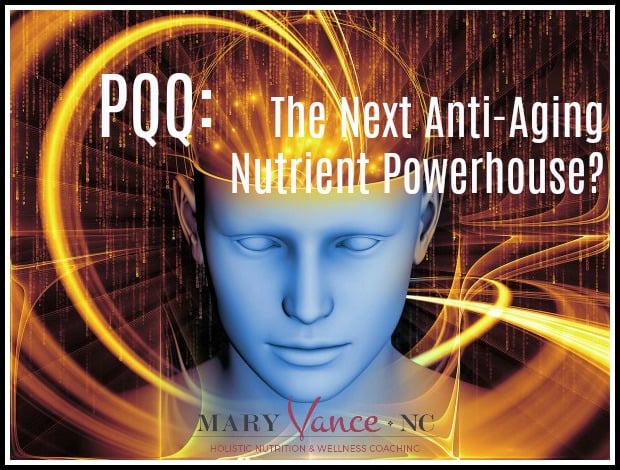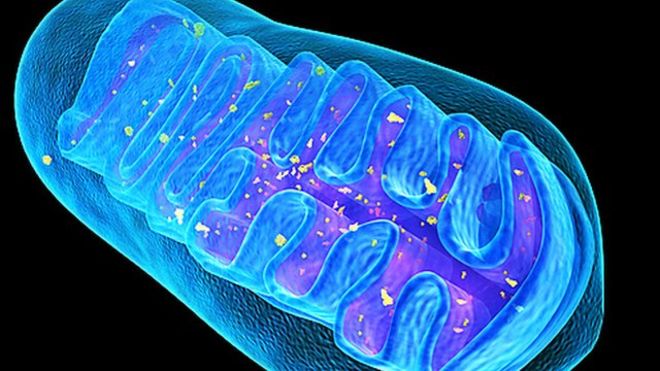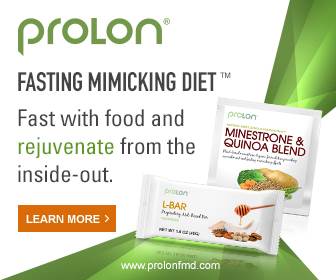Remember high school biology? You probably learned about the mitochondria AKA the cell’s powerhouse.
Think of the mitochondria as batteries that power your body. Problem is, as you age, mitochondria die, and that reduces your energy levels, longevity, and overall wellness, opening the door for disease. Enter PQQ, or pyrroloquinoline quinone: a compound that supports development of new mitochondria, increasing cellular energy production which keeps the body young and functioning efficiently. This is pretty huge, because we’ve only previously known a handful of ways to create new mitochondria, intense exercise and calorie restriction most notably.
What is PQQ & Why is it Important?
PQQ is a co-factor compound for a special class of enzymes involved in cellular function including cellular growth, development, differentiation, and survival. It’s somewhat similar to CoQ10. It also acts as a powerful antioxidant. Antioxidants fight free radical damage to cells and prevent oxidation, which accelerates aging.
The most common complaints I hear from my clients and the overall population is fatigue, followed by I can’t lose weight. I’m currently enamored with PQQ and its ability to boost energy via the mitochondria at the cellular level, thus booting metabolism. It hasn’t been well studied to date for weight loss benefits (though it’s thought to support weight loss and fight obesity), but PQQ does have a ton of benefits:
- Most promising is PQQ’s positive benefits for brain health. It’s neuroprotective, stimulates nerve growth, an encourages formation of new neurons (source). This is huge. PQQ actually reverses cognitive impairment caused by chronic oxidative stress and improves performance on memory tests in animal models (source). It may also protect against Parkinson’s and Alzheimer’s. Pretty amazing,
- Anti-aging: Creates new mitochondria which provide energy to cells and surrounding organs, keeping them youthful and healthy (and keeping you the same). Scientists agree that mitochondrial dysfunction is a biomarker of aging, so generating new mitochondria is the fountain of youth basically. PQQ also protects the mitochondria from oxidative stress.
- Heart health: In a study published in 2007, researchers at the University of California San Francisco reported that PQQ helps cells in the heart resist oxidative stress by preserving and enhancing mitochondrial function (source). May also assist in heart attack and stroke prevention.
- Inflammation: studies show PQQ reduces inflammation, the enemy of youth, and the entry point for disease (read more about inflammation here). In one study, PQQ supplementation resulted in significant decreases in the levels of plasma C-reactive protein (a marker for inflammation). May also be helpful for arthritis (source).
- Potential cancer fighter? Inflammation is always present with cancer, so any anti-inflammatory agent helps fight cancer. But PQQ seems to help the body maintain apoptosis, programmed cell death. This is critical for health, as it maintains the balance of cell division and death and eliminates abnormal cells. Too many cells = cancer, and apoptosis is blocked in cancer cells, which allows them to proliferate. PQQ turns the mitochondria of cancerous cells against themselves by triggering apoptosis. This could be huge in cancer prevention.
How Do You Get PQQ?
PQQ cannot be synthesized by the body and must be derived from food or supplements.
PQQ is available in food and in the highest concentration in natto, which is a form fermented soy.
Eggs, parsley, green peppers, kiwi, and papaya are also good sources, but it’s hard to eat the amount of PQQ needed for therapeutic benefit. I recommend just 20mg of PQQ, which is easy to get in a supplement. I take this one. I trust this company and its supplement quality. The effects of PQQ seem to be significantly amplified when test subjects also took 300 mg per day of CoQ10 (source). PQQ seems to have a synergistic effect with CoQ10. I recommend this CoQ10.
There don’t seem to be many side effects and only if taken at very high doses. More isn’t always better!
Bottom Line
Essentially what we’re looking at here is a compound that protects your body against oxidative damage, protects your heart and brain, counters inflammation, stimulates nerve growth, and promotes formation of new mitochondria for energy production. All that translates into healthier, more productive organs that function better, keeping you looking and feeling younger. Sounds too good to be true, doesn’t it?
The caveat is there aren’t too many human studies with PQQ yet; most of these are animal studies, but preliminary clinical studies are extremely encouraging, and several larger clinical trials are currently either completed waiting publication or are in process.

Mary Vance is a Certified Nutrition Consultant and author specializing in digestive health. She combines a science-based approach with natural therapies to rebalance the body. In addition to her 1:1 coaching, she offers courses to help you heal your gut and improve your health. Mary lives in San Francisco and Lake Tahoe in Northern California. Read more about her coaching practice here and her background here.










Excellent information in this article! Thank you for sharing this. I have to ask if you healed yourself of adrenal fatigue and if so what stage you were in. I believe I’ve had adrenal fatigue since early childhood.
Hi Myriam, yes, I have overcome adrenal fatigue a couple of times actually. The worst incident (stage 3) was when I was working full time and going to school, in my 20s. I suffered debilitating panic attacks and anxiety and ultimately was also diagnosed hypothyroid. For me it was a combo of herbs, diet, lifestyle changes. I talk about that more here: https://www.maryvancenc.com/adrenal-fatigue-healing-a-hormone-imbalance/
Now if I’m particularly stressed I’ll take adrenal supportive herbs.